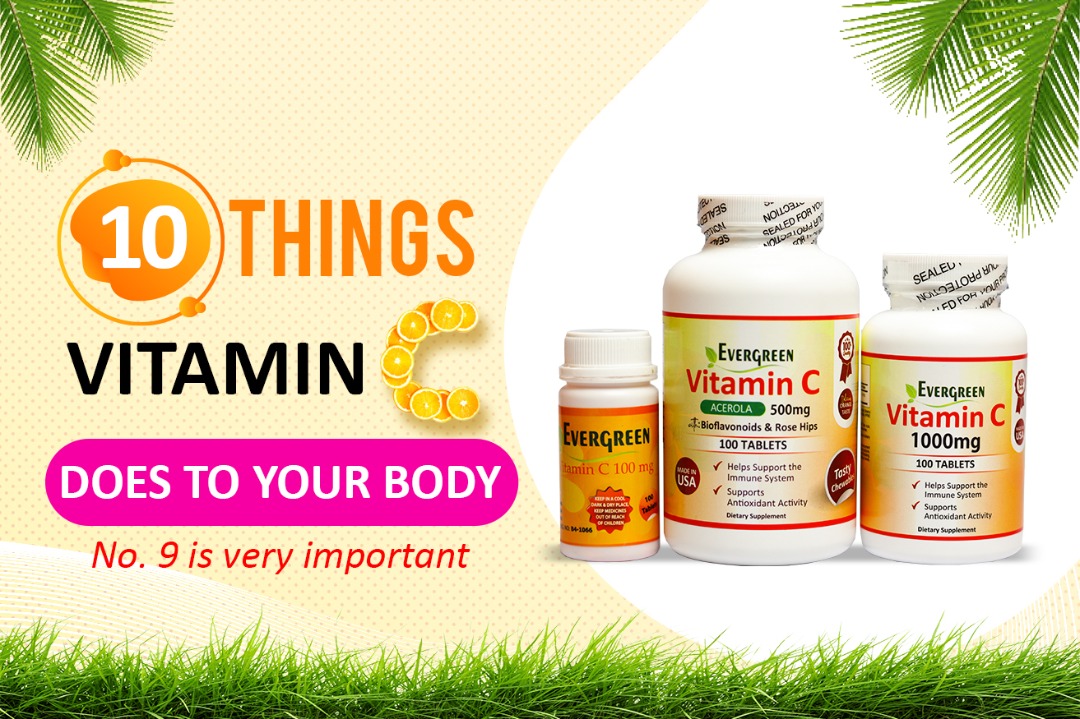Introduction
Vitamin C, also known as ascorbic acid, is a crucial nutrient that plays several vital roles in the human body. It is renowned for its antioxidant properties and its involvement in various bodily functions. Understanding the things vitamin C can do to the body can help emphasize its importance in maintaining overall health. This article explores the myriad benefits of vitamin C, shedding light on its significance and the consequences of its deficiency, particularly among children.
Statistics on People Suffering from Vitamin C Deficiency
Vitamin C deficiency, or scurvy, is a condition that arises from insufficient intake of vitamin C. According to the World Health Organization (WHO), vitamin C deficiency is rare in developed countries but still occurs in populations with poor dietary habits. It is particularly concerning among children, who require adequate vitamin C for proper growth and development. Studies indicate that approximately 7.1% of those in the United States have low serum levels of vitamin C, potentially leading to subclinical deficiencies. A study done by Moya-Alvarez et al in 2021 revealed that there are still high levels of vitamin deficiency in Africa and Nigeria. Globally, regions with limited access to fresh fruits and vegetables report higher deficiency rates, underscoring the need for better nutritional education and resources.
Recommended Daily Intake of Vitamin C for Adults and Children
Vitamin C, an essential nutrient, is crucial for various bodily functions, including the synthesis of collagen, absorption of iron, and maintenance of the immune system. The recommended daily intake (RDI) of vitamin C varies by age, sex, and life stage. Below is a detailed guide on the RDI for vitamin C for different groups.
Adults
Men
For adult men aged 19 and older, the recommended daily intake of vitamin C is 90 mg. This amount is generally sufficient to meet the physiological needs and support overall health, including immune function and antioxidant protection.
Women
For adult women aged 19 and older, the recommended daily intake of vitamin C is 75 mg. This intake level supports essential bodily functions, including skin health and protection against oxidative stress.
Children
Infants (0-12 months)
0-6 months: The Adequate Intake (AI) for infants is set at 40 mg per day. This is typically provided through breast milk or formula.
7-12 months: The AI for this age group is 50 mg per day, usually obtained through a combination of breast milk/formula and the introduction of solid foods.
Toddlers (1-3 years)
The recommended daily intake of vitamin C for toddlers is 15 mg. At this stage, children can get sufficient vitamin C through a varied diet that includes fruits and vegetables.
Children (4-8 years)
For children aged 4 to 8 years, the recommended daily intake is 25 mg. This ensures adequate growth and development, as well as the maintenance of immune health.
Pre-teens (9-13 years)
The recommended daily intake for children aged 9 to 13 years is 45 mg. This increased amount supports the higher physiological demands of this growth phase.
Teenagers (14-18 years)
Boys: The recommended daily intake for teenage boys is 75 mg.
Girls: The recommended daily intake for teenage girls is 65 mg. These recommendations cater to the varying nutritional needs due to growth spurts and hormonal changes during adolescence.
Special Considerations
Pregnant Women
Pregnant women require more vitamin C to support the developing fetus. The recommended daily intake for pregnant women aged 19 and older is 85 mg, while for those aged 18 and younger, it is 80 mg.
Breastfeeding Women
For breastfeeding women, the recommended daily intake is higher to ensure adequate vitamin C levels in breast milk. For those aged 19 and older, the RDI is 120 mg, and for those aged 18 and younger, it is 115 mg.
Things Vitamin C Can Do to the Body
1.Boosts Immune Function
One of the critical things vitamin C can do to the body is enhance immune function. It stimulates the production and function of white blood cells, crucial in defending the body against infections. Moreover, it supports the skin’s barrier function and promotes the healing of wounds.
2. Acts as a Powerful Antioxidant
Another significant thing vitamin C can do to the body is act as a potent antioxidant. It helps protect cells from damage caused by free radicals, which are unstable molecules that can lead to oxidative stress and chronic diseases like cancer and heart disease.
3. Improves Skin Health
Vitamin C is vital for collagen synthesis, a protein that provides structure to the skin. Among the things vitamin C can do to the body, enhancing skin health by promoting collagen production is notable. This helps in maintaining skin elasticity, reducing wrinkles, and aiding in wound healing.
4. Supports Cardiovascular Health
Supporting cardiovascular health is another critical thing vitamin C can do to the body. It helps in lowering blood pressure, reducing the risk of heart disease, and improving endothelial function, which is crucial for vascular health.
5. Enhances Iron Absorption
Vitamin C enhances the absorption of non-heme iron, the type of iron found in plant-based foods. This is a crucial thing vitamin C can do to the body, especially for vegetarians and individuals at risk of iron deficiency anemia.
6. Reduces Risk of Chronic Diseases
Reducing the risk of chronic diseases is a significant thing vitamin C can do to the body. Its antioxidant properties help combat oxidative stress, which is linked to chronic conditions such as cancer, diabetes, and neurodegenerative diseases.
7. Promotes Brain Health
Promoting brain health is another essential thing vitamin C can do to the body. It is involved in the synthesis of neurotransmitters and cognitive function. Adequate vitamin C levels are associated with a lower risk of cognitive decline and neurodegenerative diseases like Alzheimer’s.
8. Aids in Weight Loss
Vitamin C plays a role in metabolism, making its contribution to weight management another beneficial thing vitamin C can do to the body. It helps in the oxidation of body fat during moderate exercise, thus aiding in weight loss.
9. Reduces Inflammation
Among the things vitamin C can do to the body, reducing inflammation is crucial. It has anti-inflammatory properties that help manage inflammatory conditions like rheumatoid arthritis, thereby improving the quality of life for sufferers.
10. Supports Eye Health
Supporting eye health is another vital thing vitamin C can do to the body. It helps prevent cataracts and age-related macular degeneration by combating oxidative stress in the eye, thus preserving vision.
Vitamin C Deficiency
Vitamin C deficiency, although less common in modern societies, can lead to severe health problems. Scurvy, characterized by symptoms such as fatigue, swollen gums, joint pain, and bruising, is the most severe form of deficiency. Mild deficiencies may not show immediate symptoms but can weaken the immune system, impair iron absorption, and slow wound healing. Ensuring adequate intake of vitamin C through diet or supplements is essential to prevent these adverse health effects.
Common Sources of Vitamin C in Nigeria
Vitamin C, an essential nutrient, must be obtained through diet because the human body cannot synthesize it. It is found abundantly in a variety of fruits and vegetables, making it relatively easy to incorporate into daily meals. Here are some common sources of vitamin C:
Citrus Fruits
Citrus fruits are perhaps the most well-known sources of vitamin C. Oranges, grapefruits, lemons, and limes are rich in this vitamin. A single medium orange, for example, provides about 70 mg of vitamin C, which is close to the daily recommended intake for most adults.
Strawberries
Strawberries are not only delicious but also packed with vitamin C. A cup of strawberries contains approximately 85 mg of vitamin C, making it an excellent choice for boosting your intake.
Bell Peppers
Bell peppers, especially the red variety, are incredibly high in vitamin C. One cup of chopped red bell pepper contains about 190 mg of vitamin C, more than double the daily recommended amount for adults.
Pineapple
Pineapple is a tropical fruit that is not only tasty but also rich in vitamin C. One cup of pineapple chunks delivers around 79 mg of vitamin C, making it a great addition to your diet.
Mango
Mangoes are a sweet and juicy source of vitamin C. One cup of sliced mango provides about 60 mg of vitamin C, along with other beneficial nutrients like vitamin A and fiber.
Pawpaw
Pawpaw is another tropical fruit high in vitamin C. One cup of pawpay cubes contains about 88 mg of vitamin C. Pawpaws also contain digestive enzymes that aid in digestion.
Tomatoes
Tomatoes, whether eaten raw or cooked, are a good source of vitamin C. A medium tomato provides about 20 mg of vitamin C, while a cup of tomato juice offers around 45 mg.
Importance of Vitamin C Supplements
Vitamin C supplements play a critical role in ensuring that individuals who do not get enough from their diet still meet their daily requirements. These supplements are particularly important for people with increased needs, such as pregnant women, smokers, and those with certain medical conditions. Evergreen Vitmain C which comes in 100mg and 500mg contains the daily requirement for both adult and children.
Conclusion
In summary, the things vitamin C can do to the body are extensive and multifaceted. From bolstering the immune system to enhancing skin health and supporting cardiovascular and brain functions, vitamin C is an essential nutrient for overall well-being. Despite its importance, vitamin C deficiency remains a concern, especially among children and populations with inadequate dietary intake. Awareness of the benefits of vitamin C and the potential consequences of its deficiency can help individuals make informed dietary choices or consider supplementation to ensure optimal health.
Frequently Asked Questions (FAQs)
- What are the main sources of vitamin C?
- The main sources of vitamin C include fruits and vegetables such as oranges, strawberries, kiwi, bell peppers, broccoli, and spinach.
- How much vitamin C do I need daily?
- The recommended daily allowance (RDA) for vitamin C varies by age and gender. For adults, the RDA is 90 mg for men and 75 mg for women. Smokers require an additional 35 mg per day.
- Can I get enough vitamin C from my diet alone?
- Yes, most people can get enough vitamin C from a balanced diet rich in fruits and vegetables. However, those with dietary restrictions or increased needs might benefit from supplements.
- What are the symptoms of vitamin C deficiency?
- Symptoms of vitamin C deficiency include fatigue, swollen gums, joint pain, dry skin, and easy bruising. Severe deficiency leads to scurvy.
- Can too much vitamin C be harmful?
- While vitamin C is water-soluble and excess amounts are excreted, very high doses can cause digestive disturbances such as diarrhea and stomach cramps.
- How does vitamin C support the immune system?
- Vitamin C supports the immune system by stimulating the production and function of white blood cells and enhancing skin barriers against pathogens.
- Is vitamin C effective in preventing or treating colds?
- Vitamin C may help reduce the duration and severity of colds, especially in individuals under physical stress, but it is not a guaranteed preventive measure.
- Can vitamin C improve skin health?
- Yes, vitamin C is crucial for collagen synthesis, which helps maintain skin elasticity, reduce wrinkles, and promote wound healing.
- What role does vitamin C play in iron absorption?
- Vitamin C enhances the absorption of non-heme iron from plant-based foods, which is important for preventing iron deficiency anemia.
- Why might someone need a vitamin C supplement?
- Individuals who do not get enough vitamin C from their diet, such as those with dietary restrictions, smokers, or people with certain medical conditions, might need supplements to meet their daily requirements.

















